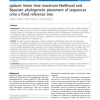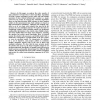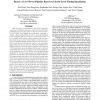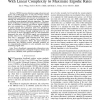69 search results - page 3 / 14 » Detecting perfect powers in essentially linear time |
BMCBI
2010
13 years 7 months ago
2010
Background: Likelihood-based phylogenetic inference is generally considered to be the most reliable classification method for unknown sequences. However, traditional likelihood-ba...
CDC
2010
IEEE
13 years 1 months ago
2010
IEEE
In this paper, we analyze the cyber security of state estimators in Supervisory Control and Data Acquisition (SCADA) systems operating in power grids. Safe and reliable operation o...
VLSID
2007
IEEE
14 years 7 months ago
2007
IEEE
Title of thesis: EFFICIENT AND ACCURATE STATISTICAL TIMING ANALYSIS FOR NON-LINEAR NON-GAUSSIAN VARIABILITY WITH INCREMENTAL ATTRIBUTES Ashish Dobhal, Master of Science, 2006 Thes...
MICRO
2003
IEEE
14 years 18 days ago
2003
IEEE
With increasing clock frequencies and silicon integration, power aware computing has become a critical concern in the design of embedded processors and systems-on-chip. One of the...
TWC
2008
13 years 7 months ago
2008
OFDMA resource allocation assigns subcarriers and power, and possibly data rates, to each user. Previous research efforts to optimize OFDMA resource allocation with respect to comm...




